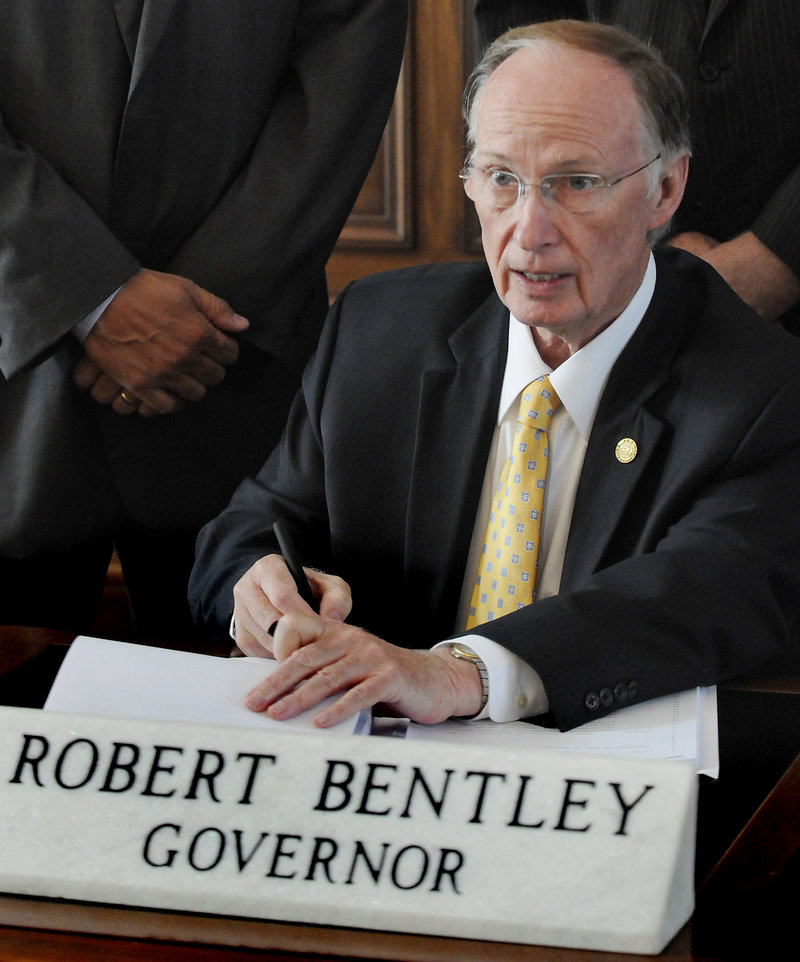ATLANTA – Alabama set a new national standard for get-tough immigration policy Thursday with Gov. Robert Bentley’s signing of a law that surpasses Arizona’s SB 1070, with provisions affecting law enforcement, transportation, apartment rentals, employment and education.
The new Alabama law, combined with legislation passed in May by neighboring Georgia, has made this swath of the Deep South the nation’s hottest immigration battleground, with the region’s troubled racial history fueling the fire.
Opponents here, perhaps predictably, often refer to that history in denouncing new laws they deem to be not only unconstitutional but also motivated by bigotry.
The 72-page legislation, known as HB 56, also touches on issues from contract law to voter registration. It makes Alabama the fourth state, after Georgia, Utah and Indiana, to follow Arizona’s lead in enacting significant statewide immigration reform, potentially mollifying those voters frustrated with Washington’s perceived failure to deal with the estimated 11.2 million illegal immigrants currently living in the U.S.
A number of other states, including California, Florida, Nevada and Texas, have seen SB 1070-style bills fail during this year’s legislative sessions, and portions of the Arizona law — including the provision requiring police to check immigration status of those they stop and suspect are in the country illegally — have been blocked by a federal judge, and may land before the Supreme Court.
The American Civil Liberties Union declared its intention Thursday to file a lawsuit opposing the law, arguing that it would invite racial profiling and require police to “demand ‘papers’ from people they stop whom they suspect are not authorized to be in the U.S.
“This Draconian initiative signed into law this morning by Gov. Robert Bentley is so oppressive that even Bull Connor himself would be impressed,” said Wade Henderson, head of the Leadership Conference on Civil and Human Rights, referring to Birmingham’s notorious segregationist public safety commissioner from the Civil Rights era. “HB 56 is designed to do nothing more than terrorize the state’s Latino community.”
Inside and outside Alabama, however, proponents of a more robust immigration policy praised the law, whose main legislative sponsors included a construction company owner and an electrical contractor.
Said Bentley, a first-term Republican and Southern Baptist deacon: “I campaigned for the toughest immigration laws and I’m proud of the Legislature for working tirelessly to create the strongest immigration bill in the country.”
In an echo of the Arizona law, the Alabama legislation requires that police, in the course of any lawful “stop, detention or arrest,” make a reasonable attempt to determine a person’s citizenship and immigration status, given a “reasonable suspicion” that the person is an immigrant — unless doing so would hinder an investigation.
The law outlaws illegal immigrants from receiving any state or local public benefits; bars them from enrolling in or attending public colleges and prohibits them from applying for or soliciting work.
It outlaws the harboring and transport of illegal immigrants, and outlaws renting them property or “knowingly” employing them for any work within the state. It also makes it a “discriminatory practice” to fire, or decline to hire, a legal resident when an illegal one is on the payroll.
The law criminalizes “dealing in false identification documents,” and, beginning April 1, 2012, will require every business in the state to verify employees’ immigration status using the federal E-Verify system.
It deems invalid any contract to which an illegal immigrant is a party, if the legal party in the contract has “direct or constructive knowledge” that the other person was in the country illegally. And it requires a citizenship check for people registering to vote.
For opponents, one of the most disturbing provisions is a requirement that officials in K-12 public schools determine whether students are illegal immigrants.
It will not ban the students from schools, but rather require every school district to submit an annual report on the number of presumed illegal immigrants to the state education board.
Copy the Story Link
Send questions/comments to the editors.



Success. Please wait for the page to reload. If the page does not reload within 5 seconds, please refresh the page.
Enter your email and password to access comments.
Hi, to comment on stories you must . This profile is in addition to your subscription and website login.
Already have a commenting profile? .
Invalid username/password.
Please check your email to confirm and complete your registration.
Only subscribers are eligible to post comments. Please subscribe or login first for digital access. Here’s why.
Use the form below to reset your password. When you've submitted your account email, we will send an email with a reset code.